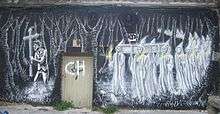compaña
Galician

The Compaña (graffiti in Pontevedra)
Etymology
From Old Portuguese companna, from Vulgar Latin *compania, from Latin compāniō (whence also French compagnon, Italian compagnone), from cum + pānis. Compare Portuguese companha and Spanish compaña.
Pronunciation
- IPA(key): /komˈpaɲa̝/
Noun
compaña f (plural compañas)
- group of people
- company
- (dated) troop or army
- (mythology, folklore) the procession of the death, also known as estantiga, the "ancient troop" (a Christianized form of the Wild Hunt)
- 1746, Martín Sarmiento, Coloquio de 24 gallegos rústicos, page 106:
- Non viche Maruxa, nas noites do inverno, andar a estantiga polos matorreiros, a estantiga digo, que chaman os vellos hostea ou compaña que a todos fai medo
- Haven't you see, Maruxa, in the winter nights, the Estantiga passing by the woods? the Estantiga, I say, that the old ones call the Host or Company, that scares everyone
- Non viche Maruxa, nas noites do inverno, andar a estantiga polos matorreiros, a estantiga digo, que chaman os vellos hostea ou compaña que a todos fai medo
- 1746, Martín Sarmiento, Coloquio de 24 gallegos rústicos, page 106:
Derived terms
References
- “companha” in Dicionario de Dicionarios do galego medieval, SLI - ILGA 2006-2012.
- “compaña” in Xavier Varela Barreiro & Xavier Gómez Guinovart: Corpus Xelmírez - Corpus lingüístico da Galicia medieval. SLI / Grupo TALG / ILG, 2006-2016.
- "compaña" in Dicionario de Dicionarios da lingua galega, SLI - ILGA 2006-2013.
- “compaña” in Tesouro informatizado da lingua galega. Santiago: ILG.
- “compaña” in Álvarez, Rosario (coord.): Tesouro do léxico patrimonial galego e portugués, Santiago de Compostela: Instituto da Lingua Galega.
Spanish
Pronunciation
- IPA(key): /komˈpaɲa/, [kõmˈpaɲa]
Derived terms
Further reading
- “compaña” in Diccionario de la lengua española, Vigésima tercera edición, Real Academia Española, 2014.
This article is issued from
Wiktionary.
The text is licensed under Creative
Commons - Attribution - Sharealike.
Additional terms may apply for the media files.